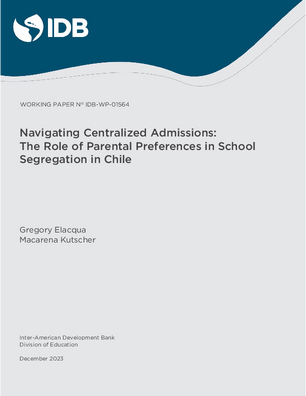Navigating Centralized Admissions: The Role of Parental Preferences in School Segregation in Chile
Date
Dec 2023
In this paper, we aim to understand some of the mechanisms behind the low impact of a Chilean educational reform on socioeconomic integration within the school system. We focus on pre-kindergarden (pre-K) admissions, which account for the highest volume of applications since all students (except those applying to private schools) must seek admission through the centralized system. We employ a discrete choice model to analyze parents school preferences. Our analysis reveals that the school choices of low-SES families are more strongly influenced by a schools non-academic attributes which are often omitted from analyses of parental preferences due to data availability constraints rather than academic quality. For instance, low-SES parents tend to prefer schools with fewer reported violent incidents, schools where students report facing less discrimination and exclusion, and schools where students demonstrate higher levels of self-efficacy. Disadvantaged families also tend to favor schools that have a religious affiliation, offer more ”classical” sports (e.g. soccer), or have a foreign name. These results have significant implications for understanding the preferences of disadvantaged families and the impact of centralized admission systems on reducing segregation. By recognizing the non-academic factors driving school choices, policymakers can better design admission systems that truly foster school diversity and equality.




